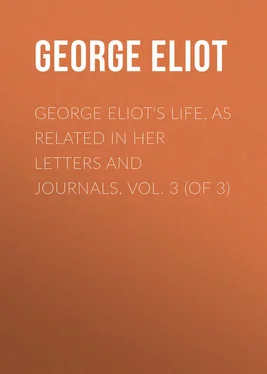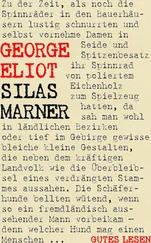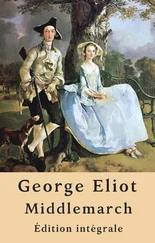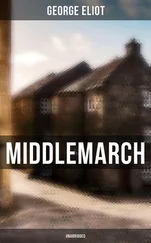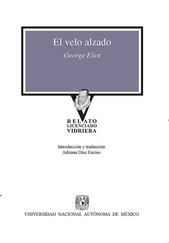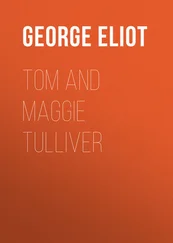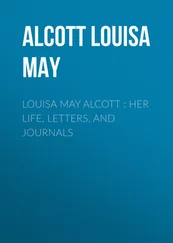George Eliot - George Eliot's Life, as Related in Her Letters and Journals. Vol. 3 (of 3)
Здесь есть возможность читать онлайн «George Eliot - George Eliot's Life, as Related in Her Letters and Journals. Vol. 3 (of 3)» — ознакомительный отрывок электронной книги совершенно бесплатно, а после прочтения отрывка купить полную версию. В некоторых случаях можно слушать аудио, скачать через торрент в формате fb2 и присутствует краткое содержание. Издательство: Иностранный паблик, Жанр: literature_19, foreign_antique, foreign_prose, на английском языке. Описание произведения, (предисловие) а так же отзывы посетителей доступны на портале библиотеки ЛибКат.
- Название:George Eliot's Life, as Related in Her Letters and Journals. Vol. 3 (of 3)
- Автор:
- Издательство:Иностранный паблик
- Жанр:
- Год:неизвестен
- ISBN:нет данных
- Рейтинг книги:4 / 5. Голосов: 1
-
Избранное:Добавить в избранное
- Отзывы:
-
Ваша оценка:
- 80
- 1
- 2
- 3
- 4
- 5
George Eliot's Life, as Related in Her Letters and Journals. Vol. 3 (of 3): краткое содержание, описание и аннотация
Предлагаем к чтению аннотацию, описание, краткое содержание или предисловие (зависит от того, что написал сам автор книги «George Eliot's Life, as Related in Her Letters and Journals. Vol. 3 (of 3)»). Если вы не нашли необходимую информацию о книге — напишите в комментариях, мы постараемся отыскать её.
George Eliot's Life, as Related in Her Letters and Journals. Vol. 3 (of 3) — читать онлайн ознакомительный отрывок
Ниже представлен текст книги, разбитый по страницам. Система сохранения места последней прочитанной страницы, позволяет с удобством читать онлайн бесплатно книгу «George Eliot's Life, as Related in Her Letters and Journals. Vol. 3 (of 3)», без необходимости каждый раз заново искать на чём Вы остановились. Поставьте закладку, и сможете в любой момент перейти на страницу, на которой закончили чтение.
Интервал:
Закладка:
Letter to John Blackwood, 21st Mch. 1867.
Your letters, with the valuable enclosure of a check for £2166 13 s. 4 d. , have come to me this morning, and I am much obliged to you for your punctual attention.
I long to see a specimen of the cheap edition of the novels. As to the illustrations, I have adjusted my hopes so as to save myself from any great shock. When I remember my own childish happiness in a frightfully illustrated copy of the "Vicar of Wakefield," I can believe that illustration may be a great good relatively, and that my own present liking has no weight in the question.
I fancy that the placarding at railway stations is an effective measure, for Ruskin was never more mistaken than in asserting that people have no spare time to observe anything in such places. I am a very poor reader of advertisements, but even I am forced to get them unpleasantly by heart at the stations.
It is rather a vexatious kind of tribute when people write, as my American correspondent did, to tell me of one paper-covered American copy of "Felix Holt" brought to Europe and serving for so many readers that it was in danger of being worn away under their hands. He, good man, finds it easy "to urge greater circulation by means of cheap sale," having "found so many friends in Ireland anxious but unable to obtain the book." I suppose putting it in a yellow cover with figures on it, reminding one of the outside of a show, and charging a shilling for it, is what we are expected to do for the good of mankind. Even then I fear it would hardly bear the rivalry of "The Pretty Milliner," or of "The Horrible Secret."
The work connected with Spain is not a romance. It is – prepare your fortitude – it is – a poem. I conceived the plot, and wrote nearly the whole as a drama in 1864. Mr. Lewes advised me to put it by for a time and take it up again, with a view to recasting it. He thinks hopefully of it. I need not tell you that I am not hopeful, but I am quite sure the subject is fine. It is not historic, but has merely historic connections. The plot was wrought out entirely as an incorporation of my own ideas. Of course, if it is ever finished to my satisfaction, it is not a work for us to get money by, but Mr. Lewes urges and insists that it shall be done. I have also my private projects about an English novel, but I am afraid of speaking as if I could depend on myself; at present I am rather dizzy, and not settled down to home habits of regular occupation.
I understand that the conveyancer who wrote to the Pall Mall is an excellent lawyer in his department, and the lecturer on Real Property at the Law Institution.
If a reviewer ever checked himself by considering that a writer whom he thinks worth praising would take some pains to know the truth about a matter which is the very hinge of said writer's story, review articles would cut a shrunken figure.
Journal, 1867.
May 5. – We went to Bouverie Street to hear the first of a course of lectures on Positivism, delivered by Dr. Congreve. There were present seventy-five people, chiefly men.
May 11. – We had Mr. and Mrs. Call to dine with us, and an evening party afterwards.
May 12. – We went to hear Dr. Congreve's second lecture. The morning was thoroughly wet; the audience smaller, but still good.
Letter to Miss Sara Hennell, 13th May, 1867.
Yesterday we went to the second of a course of lectures which Dr. Congreve is delivering on Positivism in Bouverie Street. At the first lecture on the 5th there was a considerable audience – about seventy-five, chiefly men – of various ranks, from lords and M.P.'s downwards, or upwards, for what is called social distinction seems to be in a shifting condition just now. Yesterday the wet weather doubtless helped to reduce the audience; still it was good. Curiosity brings some, interest in the subject others, and the rest go with the wish to express adhesion more or less thorough.
I am afraid you have ceased to care much about pictures, else I should wish that you could see the Exhibition of Historical Portraits at Kensington. It is really worth a little fatigue to see the English of past generations in their habit as they lived – especially when Gainsborough and Sir Joshua are the painters. But even Sir Godfrey Kneller delights me occasionally with a finely conceived portrait carefully painted. There is an unforgetable portrait of Newton by him.
Journal, 1867.
May 27. – Went with G. to the Academy Exhibition.
May 29. – Went to the Exhibition of French Pictures – very agreeable and interesting.
Letter to Mrs. Peter Taylor, 30th May, 1867.
I do sympathize with you most emphatically in the desire to see women socially elevated – educated equally with men, and secured as far as possible, along with every other breathing creature, from suffering the exercise of any unrighteous power. That is a broader ground of sympathy than agreement as to the amount and kind of result that may be hoped for from a particular measure. But on this special point I am far from thinking myself an oracle, and on the whole I am inclined to hope for much good from the serious presentation of women's claims before Parliament. I thought Mill's speech sober and judicious from his point of view – Karslake's an abomination.
À propos of what you say about Mr. Congreve, I think you have mistaken his, or rather Comte's, position. There is no denial of an unknown cause, but only a denial that such a conception is the proper basis of a practical religion. It seems to me pre-eminently desirable that we should learn not to make our personal comfort a standard of truth.
Journal, 1867.
June 1 (Saturday). – Wrote up to the moment when Fedalma appears in the Plaça.
June 5. – Blackwood dined with us, and I read to him my poem down to page 56. He showed great delight.
June 26. – We went to Niton for a fortnight, returning July 10.
July 16. – Received £2166 13 s. 4 d. from Blackwood, being the final instalment for "Felix Holt," and (£500) copyright for ten years.
Letter to Mrs. Congreve, 28th July, 1867.
Again we take flight! To North Germany this time, and chiefly to Dresden, where we shall be accessible through the Poste Restante . I am ashamed of saying anything about our health – we are both "objects" for compassion or contempt, according to the disposition of the subject who may contemplate us.
Mr. Beesley (I think it was he) sent us Dr. Congreve's pamphlet last night, and I read it aloud to George. We both felt a cordial satisfaction in it. We have been a good deal beset by little engagements with friends and acquaintances lately, and these, with the preparations for our journey, have been rather too much for me. Mr. Lewes is acting on the advice of Sir Henry Holland in giving up zoologizing for the present, because it obliges him to hang down his head. That is the reason we go inland, and not to the coast, as I think I hinted to you that we expected to do.
You are sympathetic enough to be glad to hear that we have had thoroughly cheerful and satisfactory letters from both our boys in Natal. They are established in their purchased farm, and are very happy together in their work. Impossible for mortals to have less trouble than we. I should have written to you earlier this week – for we start to-morrow – but that I have been laid prostrate with crushing headache one half of my time, and always going out or seeing some one the other half.
Farewell, dear. Don't write unless you have a real desire to gossip with me a little about yourself and our mutual friends. You know I always like to have news of you, but I shall not think it unkind – I shall only think you have other things to do – if you are silent.
Читать дальшеИнтервал:
Закладка:
Похожие книги на «George Eliot's Life, as Related in Her Letters and Journals. Vol. 3 (of 3)»
Представляем Вашему вниманию похожие книги на «George Eliot's Life, as Related in Her Letters and Journals. Vol. 3 (of 3)» списком для выбора. Мы отобрали схожую по названию и смыслу литературу в надежде предоставить читателям больше вариантов отыскать новые, интересные, ещё непрочитанные произведения.
Обсуждение, отзывы о книге «George Eliot's Life, as Related in Her Letters and Journals. Vol. 3 (of 3)» и просто собственные мнения читателей. Оставьте ваши комментарии, напишите, что Вы думаете о произведении, его смысле или главных героях. Укажите что конкретно понравилось, а что нет, и почему Вы так считаете.
